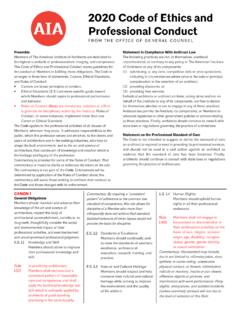Transcription of NASW Standards for Cultural Competence
1 NASW Standards for CulturalCompetencein Social Work PracticeNATIONAL ASSOCIATION OF SOCIAL WORKERS2001 NASW Standards for CulturalCompetencein Social Work PracticeTerry Mizrahi, MSW, PhDNASW President (2001-2003)Ruth W. Mayden, MSS, LSWNASW President (1999-2001)National Committee on Racial and Ethnic Diversity 1999-2001 Saundra H. Starks, EdD, ACSW, LCSWLina Fong, PhD, ACSW, LCSWEmma Montero, MSWAda E. Deer, ACSWI nderjit K. Jaipaul, DSW, ACSWC armen Ortiz Hendricks, DSW, ACSWR obert D. Showers, BSWC lara Simmons, ACSW, DCSWN elrene Yellow Bird, MSWH alaevalu F. Vakalahi, DSWI rene Moreda, DSWNASW StaffElizabeth J. Clark, PhD, ACSW, MPH,NASW Executive DirectorLeticia Diaz, MSLuisa L pez, MSWT racy Whitaker, ACSW5 Standard and AdvocacySocial workers shall be aware of the effect ofsocial policies and programs on diverse clientpopulations, advocating for and with clientswhenever WorkforceSocial workers shall support and advocate forrecruitment, admissions and hiring.
2 And retentionefforts in social work programs and agencies thatensure diversity within the EducationSocial workers shall advocate for and participatein educational and training programs that helpadvance Cultural Competence within the DiversitySocial workers shall seek to provide or advocatefor the provision of information, referrals, andservices in the languageappropriate to the client,which may include use of LeadershipSocial workers shall be able to communicateinformation about diverse client groups toother by the NASW National Committee on Racial and Ethnic DiversityAdopted by the NASW Board of DirectorsJune 23, 20014 Standards for Cultural Competence in Social Work PracticeStandard and ValuesSocial workers shall function in accordance withthe values, ethics, and Standards of the profession,recognizing how personal and professional valuesmay conflict with or accommodate the needs ofdiverse workers shall seek to develop an under-standing of their own personal.
3 Cultural valuesand beliefs as one way of appreciating theimportance of multicultural identities in thelives of KnowledgeSocial workers shall have and continue to devel-op specialized knowledge and understandingabout the history, traditions, values, family sys-tems, and artistic expressions of major clientgroups that they SkillsSocial workers shall use appropriate method-ological approaches, skills, and techniques thatreflect the workers understanding of the role ofculture in the helping process. Standard DeliverySocial workers shall be knowledgeable aboutand skillful in the use of services available in thecommunity and broader society and be able tomake appropriate referrals for their Standards for Cultural Competence in SocialWork Practiceare based on the policy statement Cultural Competence in the Social WorkProfession published in Social Work Speaks.
4 NASW Policy Statements (2000b) and the NASWCode of Ethics(2000a), which charges socialworkers with the ethical responsibility to beculturally were originallyadopted by the 1996 NASW Delegate supports and encourages the developmentof Standards for culturally competent socialwork practice, a definition of expertise, and theadvancement of practice models that have relevancefor the range of needs and services represented bydiverse client populations (NASW, 2000b, p. 61).The material that follows is the first attempt by theprofession to delineate Standards for culturallycompetent social work United States is constantly undergoingmajor demographic changes.
5 The 1990 to 2000population growth was the largest in Americanhistory with a dramatic increase in people ofcolor from 20 percent to 25 percent (Perry &Mackum, 2001). Those changes alter andincrease the diversity confronting social workersdaily in their agencies. The complexities associatedwith Cultural diversity in the United States affectall aspects of professional social work practice,requiring social workers to strive to deliverculturally competent services to an ever-increasingbroad range of clients. The social work professiontraditionally has emphasized the importanceof the person-in-environment and the dualperspective,the concept that all people are partof two systems: the larger societal system and98their immediate environments (Norton, 1978).
6 Social workers using a person-in-environmentframework for assessment need to include tovarying degrees important Cultural factors thathave meaning for clients and reflect the culture ofthe world around the United States, Cultural diversity in socialwork has primarily been associated with race andethnicity, but diversity is taking on a broadermeaning to include the sociocultural experiencesof people of different genders, social classes,religious and spiritual beliefs, sexual orientations,ages, and physical and mental abilities. A briefreview of the social work literature in the past fewyears points to the range of potential content areas that require culturally sensitive andculturally competent interventions.
7 Theseinclude addressing racial identity formation forpeople of color as well as for white people; theinterrelationship among class, race, ethnicity,and gender; working with low-income families;working with older adults; the importance ofreligion and spirituality in the lives of clients;the development of gender identity and sexualorientation; immigration, acculturation, andassimilation stresses; biculturalism; workingwith people with disabilities; empowermentskills; community building; reaching out to newpopulations of color; and how to train for culturallycompetent models of , Cultural Competence in social workpractice implies a heightened consciousness ofhow clients experience their uniqueness and dealwith their differences and similarities within alarger social NASW Board of Directors, at its June 2001meeting, accepted the following definitions ofculture, Competence , and Cultural competencein thepractice of social work.
8 These definitions aredrawn from the NASW Code of Ethicsand SocialWork The word culture is used because it implies theintegrated pattern of human behavior thatincludes thoughts, communications, actions,customs, beliefs, values, and institutions of aracial, ethnic, religious, or social group (NASW,2000b, p. 61). Culture often is referred to as thetotality of ways being passed on from generationto generation. The term culture includes ways inwhich people with disabilities or people fromvarious religious backgrounds or people who aregay, lesbian, or transgender experience the worldaround Preamble to the NASW Code of Ethics beginsby stating:The primary mission of the social work professionis to enhance human well-being and help meet thebasic human needs of all people, with particularattention to the needs and empowerment of peoplewho are vulnerable, oppressed, and living inpoverty.
9 And goes on to say, Social workers are sensitiveto Cultural and ethnic diversity and strive to enddiscrimination, oppression, poverty, and otherforms of social injustice (NASW, 2000a, p. 1).Second, culture is mentioned in two ethicalstandards:Value: Social Justiceand the Ethical Principle:Social workers challenge social means that social workers social change1110efforts seek to promote sensitivity to andknowledge about oppression and Cultural andethnic : Dignity and Worth of the Personand theEthical Principle: Social workers respect the inherentdignity and worth of the value states that social workers treat eachperson in a caring and respectful fashion, mindfulof individual differences and Cultural and word Competence is used because it implieshaving the capacity to function effectively withinthe context of culturally integrated patterns ofhuman behavior defined by the the Code of Ethicscompetence is discussed inseveral ways.
10 First as a value of the profession:Value: Competenceand the Ethical Principle: Socialworkers practice within their areas of Competence anddevelop and enhance their professional value encourages social workers to continuallystrive to increase their professional knowledgeand skills and to apply them in practice. Socialworkers should aspire to contribute to theknowledge base of the , Competence is discussed as an Competence Social workers should provide services andrepresent themselves as competent only withinthe boundaries of their education, training,license, certification, consultation received,supervised experience, or other relevantprofessional experience.








